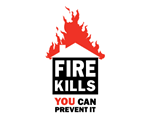 Go to main content
Go to main content
Archive Website of the UK government
Please note that this website has a UK government accesskeys system.
Main menu
Page menu
Home and community

Fire emergency equipment

Smoke alarms are essential for every home. However, you may feel that you need extra fire safety equipment, perhaps because you live in a remote place or have high-risk appliances or equipment in your home.
Using fire emergency equipment
When a fire occurs, it is important to get out, stay out and call 999. Emergency equipment can be helpful, but it is important to know how and when to use it. Unless it is safe to do so, you shouldn’t attempt to tackle fires yourself.
Fire extinguishers
There are three main types of fire extinguisher: powder, water and foam. No single type of extinguisher is totally effective on every kind of fire. Before buying one, it's vital to look carefully at what kinds of fires it can be used on. That way, you can make sure you get one suitable for your own needs.
Multi-purpose dry powder extinguishers or Aqueous Film Forming Foam (AFFF) extinguishers are usually the best choices for home use. They have the fewest dangers and are effective on many types of fire.
Tips for the safe use of any type of extinguisher:
- make sure you read the instructions and are familiar with how to use it
- only buy one you can carry easily
- it is best placed in the hall and taken where needed
- don’t put it near a heater or fire, but do fix it to the wall, so that it is out of the reach of children, but easily accessible by others
- get it serviced once a year (or as often as the manufacturer recommends)
- when using the extinguisher on a fire, keep yourself on the escape route side of the blaze
If you’re not sure which extinguisher to get for your home, you can contact your local fire and rescue service for advice.
Fire blankets
These are fire-resistant sheets of material that you can use to cover a fire to cut its supply of oxygen. They can also be wrapped around a person whose clothes are on fire.
Fire blankets are quick to use, easy to maintain and cheaper than fire extinguishers. However, to use them, you need to get close to the fire – meaning your hands will be particularly at risk of burning. You can also only use them on very small and contained fires - like chip pan fires on the cooker. In addition, it is likely that you will only get one go at putting out the fire. If you don’t put it out, you won’t be able to retrieve the blanket.
They're ideal to keep in the kitchen, but they are not good for general use. If you get one, you should make sure it conforms to British Standard BS 6575 and bear these points in mind:
- it should be easy to get to in an emergency
- never put it away in a cupboard
- it shouldn't be mounted above a cooker or heater
- a fire blanket is most useful in the kitchen
Sprinklers
If you want to reduce the risk of death in a fire as much as possible, you could consider fitting sprinklers in your home. They provide a high level of protection from the risk of dying in a fire. They are particularly suitable for older people and for those who have difficulty moving around or have some other disability. In parts of the USA where sprinklers have become compulsory, almost no one dies from fire at home.
If you’re considering getting a sprinkler system fitted, here are some further points to bear in mind:
- sprinklers are fitted in as many rooms as you want them to be - their pipes are small and run off mains water
- they are individually heat-activated, so the whole system doesn't go off at once
- they rarely get set off accidentally as they need high temperatures to trigger them
- they operate automatically, whether you're at home or not
- if you have a sprinkler system, you should also have a smoke alarm, as this will alert you to slow-burning, smoke-generating fires which may not generate enough heat to trigger the sprinkler
- sprinklers also sound an alarm when they go off, so they alert you as well as tackling the fire
 Facebook
Facebook Twitter
Twitter StumbleUpon
StumbleUpon Delicious
Delicious Reddit
Reddit
